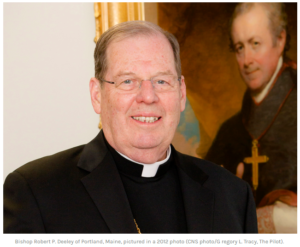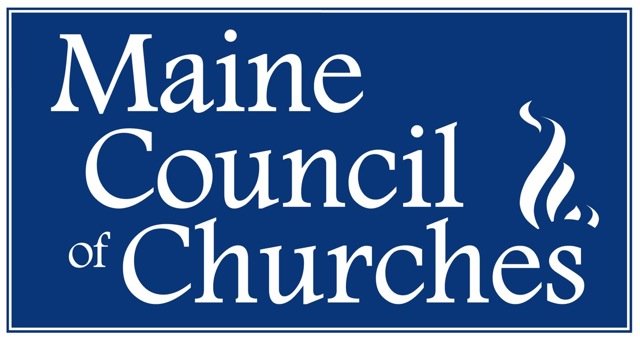Maine diocese withdraws from Council of Churches
Michael J. O’Loughlin, national correspondent for America, June 01, 2018
When a gunman killed 49 people at an Orlando nightclub popular with the L.G.B.T. community in 2016, some members of the Maine Council of Churches wanted to issue a statement expressing support for the victims and calling for an end to homophobia. But because of an unwritten rule that required unanimous consent from members before issuing any public statements, which had stopped the council in the past from expressing support for same-sex marriage despite most of the member churches supporting it, there was trepidation about what kind of language they should use.
Eventually, the group did release a statement, but in it they tried to “walk the line” between signaling support for L.G.B.T. rights and condemning violence against the community, the group’s leader, the Rev. Jane Field, told America, upsetting some members who resented needing to be so cautious in their language at a time when the L.G.B.T. community was grieving.
“We realized that we were feeling unsure of ourselves, of what would be O.K. for us to say publicly and what would offend or contradict what our Roman Catholic brothers and sisters would want the council to be saying publicly,” Ms. Field said. “That felt like a tipping point for me personally, where a number of our representatives said, ‘This can’t go on like this anymore.’”
“Our continuing participation could result in me advocating for two different, and even contradictory, positions,” Bishop Deeley wrote.
That is when the group launched what would become a 20-month process of updating its rules about what to say publicly. In February, the council decided it would issue public statements based on a majority vote of its members rather than following an unwritten rule that required unanimous consent. That change left Bishop Robert Deeley of Portland, the only diocese in Maine, uneasy, afraid that he would be part of a group whose public positions contradicted the Catholic Church’s views.
He decided the diocese would withdraw its membership, which dated back to the 1980s.
In a letter sent to the president of the council, Bishop Robert Deeley said the Diocese of Portland would withdraw its membership next month.
“As the Bishop of the Diocese I find this unfortunate, but I see no alternative. Our continuing participation could result in me advocating for two different, and even contradictory, positions,” Bishop Deeley wrote in a letter dated April 23. “What I advocate for cannot be simply determined by a majority vote. It is expected that my advocacy is grounded in the teachings of the Church. Any other position would be contrary to my responsibility as the bishop of Portland.”
As it turned out, shortly after the new rules went into effect the Maine Council of Churches took a public stand on an issue on which the Catholic diocese did not agree.
Earlier this year, lawmakers in Maine considered a bill that would ban so-called conversion therapy, a controversial practice that claims to be able to change an individual’s sexual orientation. (The bill was introduced by State Representative Ryan Fecteau, a graduate of the Catholic University of America who was the first openly gay student to serve as president of the student general assembly.)
While the Catholic Church does not have an official stance on this kind of therapy, the Diocese of Portland testified against the ban, saying the bill “limits choice” and interferes in the relationship between licensed counselors and patients.
But the Maine Council of Churches supported the ban, submitting written testimony that it again made public in a letter to The Portland Press Herald in March, in which Ms. Field noted that many Christian denominations are against the practice, quoting the group’s statement to lawmakers during the debate.
“Sexual orientation and gender identity are a gift from God—not a condition that needs treatment, not a choice that needs conversion, not something broken that needs repair, not a sin that needs forgiveness,” the letter states, quoting the testimony. “Conversion therapy is psychological and spiritual malpractice and amounts to torture.”
(The letter does make clear, however, that the testimony was offered on behalf of its seven denomination members that have come out against conversion therapy. The Catholic Church was not listed and Ms. Field said several times that the timing of the conversion therapy debate was coincidental and was not the reason the diocese withdrew its membership. The law banning the therapy passed in the Maine House of Representatives in April.)
Emails and a call to the Diocese of Portland were not returned on Thursday.
Bishop Deeley is not alone in his decision to withdraw his diocese from membership in state-level Council of Churches.
Catholic participation in Councils of Churches, which exist at the local, national and international levels, is rare.
In 2013, the bishops of the Diocese of Raleigh and the Diocese of Charlotte announced that they would both withdraw from the North Carolina Council of Churches. Like Bishop Deeley, Bishop Michael F. Burbidge and Bishop Peter J. Jugis said that some public statements from the group implied that the two Catholic leaders were in agreement “with positions that are at times in contradiction with their practice and the teaching of their faith.” A 2013 article from Catholic News Service notes that the decision was based on the council’s support for same-sex marriage and its neutral stance on abortion, both of which the Catholic Church opposes. More recently, the Diocese of Manchester withdrew from the New Hampshire Council of Churches.
Catholic participation in Councils of Churches, which exist at the local, national and international levels, is rare.
The World Council of Churches was founded in the 1940s, and the Catholic Church has never sought membership, in part because the Catholic Church has historically considered itself to be the only authentic Christian church. But since the 1960s, Catholic leaders have met annually with the W.C.C., and Pope Francis is expected to meet with representativesfrom the council in Geneva next month to commemorate the group’s 70th anniversary.
Only a small number of Catholic dioceses in the United States are members of state councils, though others, such as Catholic dioceses in Wisconsin and Massachusetts, operate as partners or observers rather than as full members. The U.S. Conference of Catholic Bishops is listed as a partner on the website of the National Council of Churches.
Still, Catholic bishops maintain a national office of ecumenical affairs and many dioceses employ staff devoted to ecumenical efforts. In 2004, U.S. bishops joinedChristian Churches Together in the U.S.A., an ecumenical group they helped create in 2001 to bring together representatives from all major Christian traditions. Unlike the National Council of Churches, this group appears to shy away from statements about contentious social issues, focusing on dialogue among members and on issues on which most churches largely agree.
In his letter, Bishop Deeley thanked the Maine Council of Churches for its “continuing witness to the truth of our faith in our community” and said the decision to withdraw was not made “lightly or happily” He added, “Our corporate religious witness in a secular society has been a value to the people of Maine.”
As for Ms. Field, she said she respects the diocese’s decision to leave rather than be put in a position that makes them feel they are compromising their values. She sent a letter to Bishop Deeley immediately after she was notified that the Diocese of Portland was leaving the Maine council. She thanked him for the diocese’s past involvement and let him know that the door is always open for future collaboration.
“There is plenty of common ground that we still stand on, like poverty, hunger, human trafficking and climate change,” she said.
“We take seriously the Gospel teaching to love one another and we are earnestly seeking a way to be in relationship,” she said. “That’s my prayer and my hope.”

